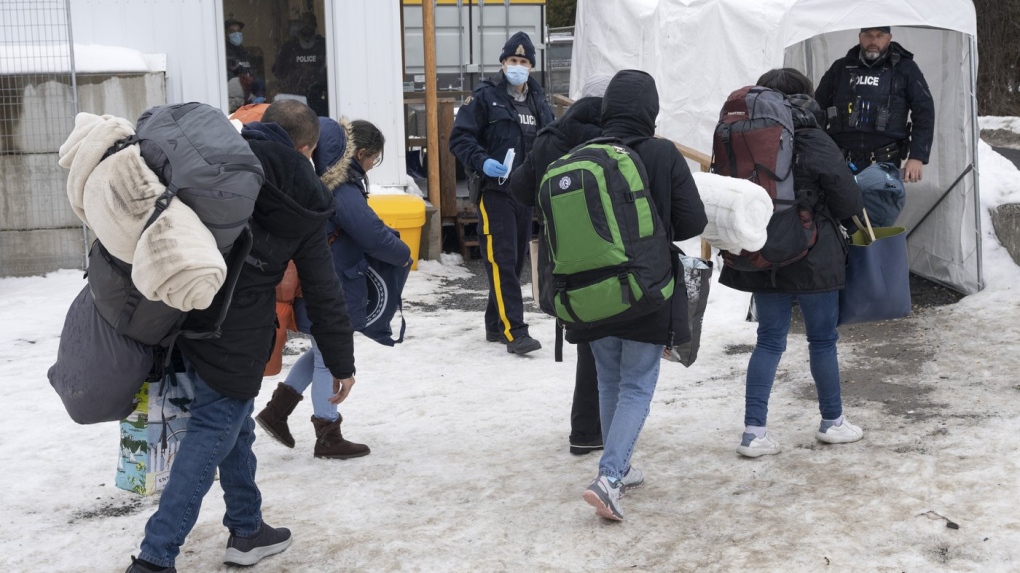
OTTAWA – Canada and the United States are negotiating a deal that could see asylum seekers turned back at irregular border crossings across the border, including Roxham Road in Quebec.
A Canadian government official with knowledge of the talks says Prime Minister Justin Trudeau and President Joe Biden will discuss the issue when they meet in Ottawa on Friday.
The Canadian Press is granting anonymity to the official to discuss matters not yet made public.
Such a deal would not physically close off the Roxham Road unofficial crossing in Quebec, where thousands of migrants have entered Canada so they can make an asylum claim.
But it would mean that migrants who continue to cross there, or at any other unofficial crossing, would be treated as if they crossed at an official border checkpoint and be returned to the United States to make an asylum claim there.
Those travelling into the U.S. from Canada at unofficial crossings would likewise be returned north of the border by American authorities.
Under the Safe Third Country Agreement, first signed between the U.S. and Canada in 2004, asylum seekers must make their claim in whichever country they arrive first. That currently applies only to official border crossings.
But increasing numbers of migrants are opting to get around that rule by crossing at unofficial locations, such as at Roxham Road, 50 kilometres south of Montreal. In 2022, 39,000 people claimed asylum after crossing an unofficial border point into Quebec.
A potential renegotiated deal would reimagine all 8,900 kilometres of the shared border as an official crossing under the Safe Third Country Agreement, the official said.
The official stressed there is no deal on paper at this time, and a lot of details are still to be worked out, including Canada agreeing to take on a certain number of migrants from the U.S. through official channels.
The two leaders will likely address the talks following their bilateral meeting in Ottawa on Friday. But whether they make a formal announcement of a deal — or just say they intend to reach a deal — is still to be determined, the official said.
White House press secretary Karine Jean-Pierre, who briefed reporters on board Air Force 1, stopped short of confirming a deal had already been done.
«We’re seeing an increase in irregular migration going north into Canada, which reflects the regional and global migration challenges we have been talking about,» Jean-Pierre said Thursday.
«We’re committed to working with them to address it, including by prioritizing orderly and safe migration through regular pathways.»
She added: «We feel like we have had great success with our partners in Canada, and we expect to continue that co-ordination.»
A lawyer for Amnesty International called the move to expand the provisions of the agreement «unconscionable,» from a human-rights perspective.
«It’ll just push people to more remote areas, more dangerous crossings,» said Julia Sand, a lawyer for the organization.
«If they’re not going to be offered protection in the United States, they’ll do what they need to do to get here, and that will just push people into dangerous situations.»
The organization is one of three that are challenging the constitutionality of the Safe Third Country Agreement in the Supreme Court, arguing that the United States can’t be counted on to carry out Canada’s obligations to refugees under international law.
Meanwhile, the mayor of Niagara Falls, Ont., expressed relief that Canada and the U.S. appear to have made a tentative decision on the border crossing.
The federal government began transferring asylum claimants to various cities in Ontario, including Niagara Falls, after the Quebec government voiced concerns the migrants were placing pressure on publicly funded services.
Mayor Jim Diodati said 2,000 hotel rooms have been booked by the federal government for the asylum seekers and he found out Thursday that 500 more rooms were reserved for another group arriving on buses from the country road.
«That’s a lot of people in our community, considering (the) population is about 95,000 people,» he said in a phone interview. «That’s a huge, immediate impact to our community.»
The federal immigration minister’s office would not comment on the details and status of the Canada-U.S. negotiations on Thursday.
At a press conference Wednesday, Immigration Minister Sean Fraser would only say his department was working on a solution that would go beyond the politics of the president’s visit and «provide an actual lasting solution» to irregular border crossings.
Fraser said there has been no need for «horse trading» in the negotiations with the U.S. on the issue.
«This is something that both Canada and the United States believe in, is having an orderly policy at all of our borders, but also welcoming immigration policies for those who are fleeing violence, war, or persecution,» he said.
There are larger-scale issues that must also be addressed, he said, including capacity to address the root causes of migration from countries people are fleeing from in the first place.
Biden was set to arrive in Canada Thursday night for a 27-hour state visit, his first formal trip to Canada since being sworn in as the U.S. president in January 2021. Trudeau and Biden are scheduled to meet for a formal bilateral discussion in Trudeau’s Parliament Hill office Friday morning.
Canada and the United States have been discussing how to improve the Safe Third Country Agreement for nearly five years.
In Canada, there are political divisions about what to do, with Conservative Leader Pierre Poilievre calling for Canada to just «close» Roxham Road.
NDP Leader Jagmeet Singh, for his part, wants the Safe Third Country Agreement suspended, allowing any migrant to make a claim in Canada regardless of how they get here.
«We believe that would give dignity to people that are already fleeing serious threats to their lives,» Singh told reporters Thursday, though he said he’s open to other solutions.